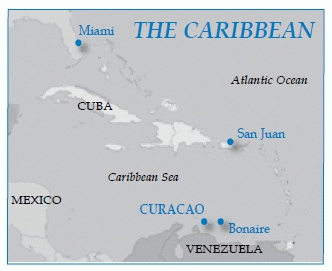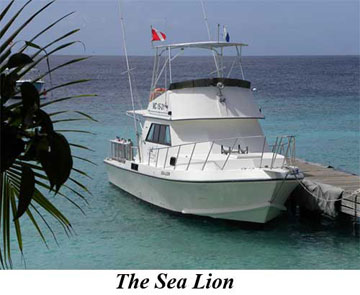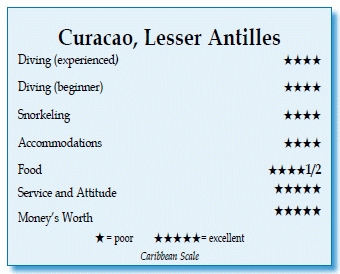Bas Harts Diving and Go West, CuracaoContents of this Issue: Will You Join Sylvia Earle and Not Eat Fish? British Report on Dive Deaths: The Aging Diver Is at Risk Bas Harts Diving and Go West, Curacao Turning Oil Rigs into Diveable Reefs How Is Your Dive Insurance in an Emergency? Yes, Letís Scrap the Lifetime C-Card The Aftermath of a Fatal Dive Accident Bahamas Shark Attacks Snorkeler Can Jennifer Lawrence Turn Freediving Into a Blockbuster ? Editorial Office: Ben Davison Publisher and Editor Undercurrent 3020 Bridgeway, Suite 102 Sausalito, CA 94965 dive by land or by sea: which is best on this island? from the February, 2015 issue of Undercurrent
Dear Fellow Diver: In 2004, I retired from the corporate world to work at the things I enjoy -- diving and flying. Still not able to fully retire, I have to wait for my bride of 34 years to finish her career. (I gave her the ring down 45 feet on Palancar Reef, in Cozumel, and I didn't have a lot of money back then, so the fact that the diamond looked 30 percent larger underwater may have helped seal the deal.) In addition to dive trips to old favorites, we try different Caribbean destinations annually, such as Aruba and St. Maarten. In 2013, it was Curacao for shore diving, where my non-diving traveling companions would find plenty to do. Bas Harts Diving specializes in Curacao shore diving, and after a fine experience last year -- as well as falling in love with Curacao -- we broke tradition and returned this past December. Wondering whether shore diving really was the better way to go, I also booked a two-tank boat dive. With 150,000 residents, Curacao is one of the three islands in the Dutch Antilles, between Aruba and Bonaire and not far from the Venezuelan coast. The airport is near Willemstad, the charming capital, with narrow buildings, each painted a vivid color -- bright yellow next to purple, next to bright orange, next to green and so on. A reef surrounds the island and is accessible for shore diving on the western side, where there seems to be endless named sites just a stone's throw away from others, so you can actually dive two or three sites on one dive. I arrived Saturday afternoon and settled in my Coral Estates villa. Sunday morning, right on time, Bas knocked on the door. We grabbed a cup of coffee and sat on the veranda. Bas, a hard-working, customer-oriented Dutchman in his early 30s, has lived in Curacao for nine years, building a business as a private instructor and guide specializing in shore diving. Small groups of four or less are his bread and butter. He has a good sense of humor . . . considering he's Dutch. After finding out that Bas was going to become a father any minute, we got down to business. "So what do you want to do today?" he asked. I told him I had both a new macro lens and a new fisheye lens that needed to be put to the test. (Score one point for shore diving: it was my schedule and plan.) We loaded up his fourwheel- drive truck, and 10 minutes later we were driving down a jeep trail that emerged from the jungle-like undergrowth on secluded No Name Beach. While Bas said we were about to try something different than last year, the site had a similar look to it. Then I spotted a tree with a hole through its trunk 40 feet up the beach. "Hey, Bas, we were here last year," I said. His reply: Last year, we had parked by that tree, and that dive site is Lagun. Today we were at a different dive site called No Name. (That's why there are so many named dive sites on Curacao.) Bas threw out his mats and we sat on the tailgate and suited up. (One more point for shore diving: no rushing.) We worked our way across the coral beach and into the light surf for our 50-foot swim to the reef. (One point for boat diving: no surf entries.) The reef was healthy and loaded with the gamut of reef fish -- soldierfish, trumpetfish, butterflies, angels, drum, boxfish, tangs, wrasses, lionfish, morays, turtles and all kinds of corals, sponges and gorgonians, but nary a big fish. That's Curacao. Nonetheless, the 82-degree water was blue and clear, with visibility upward to 100 feet. My dive to 65 feet lasted 68 minutes. (One point for shore diving: it's your dive.) Next came a major decision: Head for dive two, or go grab a burger and cold drink, then dive? The burger plan won.
My group rented a fine four-bedroom villa in Coral Estates, which is near Willebrordus (the locals call it Wille), 20 minutes northwest of Willemstad. We did a lot of our cooking and grilling outside, getting our food from the excellent but very expensive Centrum Supermarket, which has several locations on Curacao. We also bought fresh fish at Piscado, when the fishermen come in, around 11 a.m. Curacao has many fine restaurants, especially in Willemstad. De Gouverneur is an excellent steak house on the harbor, and the superb Fishalicious in Punda is pricey ($75 to $100 per person, with wine), but well worth it. A couple of days before my boat dive, Bas and I stopped by Go West Diving's shop, which was close to Coral Estates. From the parking lot, the 24 very steep steps down to the shop could be a concern for some. On Bas's advice, I booked the Thursday trip, which was going to Black Coral and Watamula, sites that can only be reached by boat (one point to boat diving: access to more sites). I was to be there at 8 a.m., as the boat departed at 8:30 and would return at 12:30 (one point for boat diving: a schedule), which meant I could actually tell my companions what time I could meet for lunch.
Irene and Paulene, our two Dutch divemasters who knew what they were doing, divided us into two groups. I got Paulene, who briefed us on each dive and gave the rules about max depth, safety stop, etc. Sliding along at the site Black Coral, I saw the typical trumpets, drums, soldiers, boxfish and barracuda among the plentiful corals and sponges. Paulene let us do our own thing while keeping the dive moving along. From the front of the group, I would get and return the OK sign from her, but never felt I was being rushed during our 58-minute dive, as I lagged behind, stopping to shoot pictures. Back on the boat, we snacked on orange slices and raisin rolls as we moved to Watamula. My camera bobbed around in a rinse tank with several other cameras and lights, which made me a little nervous (one point for shore diving: personal space). On the way, we stopped at the shop's dock to pick up another diver who couldn't make the 8:30 departure. It was less than a five-minute delay, but demonstrated Go West's flexibility and customer service. Irene did a quick current check (it was barely noticeable) to determine which direction we would go and where the boat would moor for pickup. The dive went from 25 feet to 60 feet, and the entire bottom was covered with small coral mountains and valleys that we glided through. Star, plate, brain and soft corals were plentiful, as were typical reef fish. Spotted morays cowered in the crevices formed by the abundant coral growth. A beautiful dive that I wished would not end. In total, I logged 113 minutes on two boat dives. I have been on too many boats that want you to head up at 30 minutes, 45 tops. It was nice to dive the whole dive. On shore, Go West had large rinsing tanks and freshwater showers, then it was three trips up and down the steps, with wet gear weighing a lot more than the dry gear I brought down.
I finished the week making more shore dives with Bas, including one at the Superior Producer, an open wreck in the Willemstad harbor. A 200-foot-long supply boat that sank in 1977, she sits upright at 107 feet and is the home to many fish, including a large green moray that made its home underneath the deck stairs amidships. Shore diving is tricky, unless you have someone like Bas to show you where the "steps" are.
So, boat dive or shore dive in Curacao? It appears that the score is tied at three points each. When I thought about writing this, I was sure shore diving would outscore boat diving by two to one. I was wrong. I guess that it comes down to personal preference. If you're there to spend the day diving places not many people go to, and doing what you want to do, then Bas Harts is the ticket, at least for a couple of days to get the lay of the land before you go it alone. If you want to make a couple of morning dives before spending the afternoon doing something else, then Go West Diving is a good choice. Either way,you will find diving Curacao well worth your time. Oh, and Curacao also offers a lot to nondivers. There are two nice golf courses and a couple of upscale casinos that would like to see your money. I visited several great art galleries, my favorite being Nina Sanchez's, who paints island people and places using all the brilliant island colors. Of course, there are plenty of shopping opportunities around the Old Fort in Willemstad; afterwards, I crossed the floating bridge to Punda to enjoy the outdoor cafes. I left after a week, filled with good Caribbean diving, good food and plenty of activity. The next day, Bas's wife gave birth to a baby boy, Nade Harts. Congrats! -- J.P.W.
|

I want to get all the stories! Tell me how I can become an Undercurrent Online Member and get online access to all the articles of Undercurrent as well as thousands of first hand reports on dive operations world-wide
| Home | Online Members Area | My Account |
Login
|
Join
|
| Travel Index |
Dive Resort & Liveaboard Reviews
|
Featured Reports
|
Recent
Issues
|
Back Issues
|
|
Dive Gear
Index
|
Health/Safety Index
|
Environment & Misc.
Index
|
Seasonal Planner
|
Blogs
|
Free Articles
|
Book Picks
|
News
|
|
Special Offers
|
RSS
|
FAQ
|
About Us
|
Contact Us
|
Links
|
3020 Bridgeway, Ste 102, Sausalito, Ca 94965
All rights reserved.

 Over a great burger under the palapa at Porto Marie, we planned our next
dive based on the macro lens I wanted to use, then headed to Piscado, a small
harbor that is home to small fishing boats. We geared up and swam out 100
feet, then descended to swim underneath the boats, listening for other boats
coming or going. In less than 100 yards, we dropped down to the reef at 30
feet and behold: Pederson cleaner shrimp, banded coral shrimp, spotted cleaner
shrimp, bearded and orange fire worms and lettuce sea slugs. A macro photographer's
fantasyland.
Over a great burger under the palapa at Porto Marie, we planned our next
dive based on the macro lens I wanted to use, then headed to Piscado, a small
harbor that is home to small fishing boats. We geared up and swam out 100
feet, then descended to swim underneath the boats, listening for other boats
coming or going. In less than 100 yards, we dropped down to the reef at 30
feet and behold: Pederson cleaner shrimp, banded coral shrimp, spotted cleaner
shrimp, bearded and orange fire worms and lettuce sea slugs. A macro photographer's
fantasyland. That Thursday, I made two trips down
those stairs, first with my gear and then
with my camera. After checking in with the
friendly, professional staff, I boarded
their nice 38-foot Delta Custom named Sea
Lion, set up to handle 18 divers. I set
up my gear and quickly made new friends
with a group of Pennsylvania guys who spun
stories about Atlantic wreck diving (one
point for boat diving: meeting new diving
friends).
That Thursday, I made two trips down
those stairs, first with my gear and then
with my camera. After checking in with the
friendly, professional staff, I boarded
their nice 38-foot Delta Custom named Sea
Lion, set up to handle 18 divers. I set
up my gear and quickly made new friends
with a group of Pennsylvania guys who spun
stories about Atlantic wreck diving (one
point for boat diving: meeting new diving
friends). On one day I had reserved dives with Bas, he also had a couple booked for
their advanced openwater training, so he didn't charge me. The couple had just
received their openwater certification the week before. While we were gearing,
Bas asked the woman, who was 5'3" and maybe 125 pounds, how much weight she
needed. She asked for 18 pounds. Bas in all his best Dutch etiquette said, "No
way in hell am I putting 18 pounds of
weights on you!" That was the first
sign that maybe their openwater course
had left much to be desired. After
their first dive, Bas told me they
were not capable of getting their
advanced course done and done correctly
before they left the island. It
was a lot of money to refund, but he
said he would have to let them know
and do it gently. As we walked back
to the truck, the man asked Bas, "How
did we do?" Bas replied, "I can tell
you that you won't be getting your
advanced openwater from me." So much
for gentle. He said if they wanted
to do the next dive and two dives
the next day, he would guarantee they would leave Curacao better divers and would have some of their advanced requirements
signed off. They agreed and thanked Bas for his concern and honesty. He not
only kept the money they paid, but got a nice tip as well.
On one day I had reserved dives with Bas, he also had a couple booked for
their advanced openwater training, so he didn't charge me. The couple had just
received their openwater certification the week before. While we were gearing,
Bas asked the woman, who was 5'3" and maybe 125 pounds, how much weight she
needed. She asked for 18 pounds. Bas in all his best Dutch etiquette said, "No
way in hell am I putting 18 pounds of
weights on you!" That was the first
sign that maybe their openwater course
had left much to be desired. After
their first dive, Bas told me they
were not capable of getting their
advanced course done and done correctly
before they left the island. It
was a lot of money to refund, but he
said he would have to let them know
and do it gently. As we walked back
to the truck, the man asked Bas, "How
did we do?" Bas replied, "I can tell
you that you won't be getting your
advanced openwater from me." So much
for gentle. He said if they wanted
to do the next dive and two dives
the next day, he would guarantee they would leave Curacao better divers and would have some of their advanced requirements
signed off. They agreed and thanked Bas for his concern and honesty. He not
only kept the money they paid, but got a nice tip as well. Divers Compass: Bas charges based on the number of divers in
a group, but estimate $130 per person for two tanks, including
pickup (
Divers Compass: Bas charges based on the number of divers in
a group, but estimate $130 per person for two tanks, including
pickup ( 